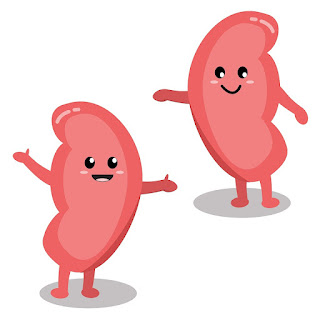Keeping your
kidneys healthy is vital for overall well-being and the proper functioning of
your body. The kidneys play a crucial role in filtering waste products, regulating
fluid balance, producing hormones, and maintaining optimal blood pressure. In
this comprehensive guide, we will explore various aspects of kidney health and
provide practical tips to help you keep your kidneys healthy.
- Stay Hydrated:
- Drink an adequate amount of
water throughout the day to support kidney function and prevent
dehydration.
- Proper hydration helps in the
elimination of waste products and toxins from the body.
- Maintain a Healthy Blood
Pressure:
- High blood pressure can damage
the blood vessels in the kidneys and lead to kidney disease.
- Monitor your blood pressure
regularly and strive to keep it within a healthy range (below 120/80
mmHg).
- Follow a balanced diet, exercise
regularly, limit sodium intake, and take prescribed medications if
necessary.
- Eat a Balanced Diet:
- Consume a diet rich in fruits,
vegetables, whole grains, lean proteins, and healthy fats.
- Limit your intake of processed
foods, saturated fats, and added sugars.
- Avoid excessive protein
consumption, as it can strain the kidneys over time.
- Limit Salt Intake:
- Excessive sodium intake can
raise blood pressure and strain the kidneys.
- Limit your consumption of
high-sodium foods such as processed snacks, canned soups, and fast food.
- Opt for herbs, spices, and salt
alternatives to flavor your meals.
- Control Blood Sugar Levels:
- High blood sugar levels can
damage the kidneys over time and lead to diabetic kidney disease.
- If you have diabetes, closely
monitor your blood sugar levels, follow your healthcare provider's
recommendations, and take prescribed medications as directed.
- Avoid Smoking:
- Smoking damages blood vessels
and reduces blood flow to the kidneys.
- Quit smoking to improve kidney
health and reduce the risk of kidney disease.
- Limit Alcohol Consumption:
- Excessive alcohol intake can
lead to kidney damage and increase the risk of kidney disease.
- If you choose to drink alcohol,
do so in moderation. Follow guidelines recommended by health
organizations: up to one drink per day for women and up to two drinks per
day for men.
- Exercise Regularly:
- Engage in regular physical
activity to improve overall health and reduce the risk of chronic conditions
that can affect the kidneys, such as obesity and high blood pressure.
- Aim for at least 150 minutes of
moderate-intensity aerobic activity or 75 minutes of vigorous activity
per week.
- Maintain a Healthy Weight:
- Obesity is a risk factor for
kidney disease.
- Follow a balanced diet, engage
in regular physical activity, and strive to achieve and maintain a
healthy weight.
- Consult with a healthcare
professional to determine your ideal weight and create a personalized plan
if needed.
- Practice Safe Medication Use:
- Some medications, when taken in
excessive amounts or over a prolonged period, can harm the kidneys.
- Follow medication instructions
carefully, including dosage and duration of use.
- Inform your healthcare provider
about any existing kidney conditions or concerns.
- Stay Hygienic:
- Practice good hygiene to reduce
the risk of urinary tract infections that can lead to kidney infections.
- Wash your hands regularly,
especially before handling food or eating, and after using the restroom.
- Limit Non-prescription Pain
Relievers:
- Over-the-counter pain relievers,
such as nonsteroidal anti-inflammatory drugs (NSAIDs), can cause kidney
damage when used excessively or for prolonged periods.
- Use these medications sparingly
and according to the recommended dosage guidelines.
- Consult with a healthcare
professional if you have any concerns or if you require pain management
on a regular basis.
- Avoid Exposure to Toxins:
- Minimize exposure to chemicals,
toxins, and pollutants that can harm the kidneys.
- Use protective equipment and
follow safety guidelines when working with chemicals or toxins.
- Be cautious with household
cleaning products, pesticides, and other potentially harmful substances.
- Stay Informed:
- Stay updated on the latest
research and recommendations related to kidney health.
- Attend educational seminars,
read reputable sources, and consult healthcare professionals for
personalized advice.
- Get Regular Health Check-ups:
- Schedule regular check-ups with
your healthcare provider to assess your overall health, including kidney
function.
- Discuss your medical history,
lifestyle habits, and any concerns you may have.
- Follow your healthcare
provider's recommendations for screenings, vaccinations, and preventive
measures.
- Be Cautious with Herbal
Supplements:
- Some herbal supplements can have
adverse effects on kidney function.
- Consult with a healthcare
professional before starting any new herbal supplements or alternative
therapies.
- Know Your Family History:
- Some kidney conditions, such as
polycystic kidney disease, have a genetic component.
- Familiarize yourself with your
family's medical history and inform your healthcare provider to identify
potential risks.
- Avoid Excessive Use of OTC
Supplements:
- Certain over-the-counter dietary
supplements, such as creatine, can potentially harm the kidneys when used
in high doses or for extended periods.
- Use OTC supplements cautiously
and follow the recommended dosage guidelines.
- Manage Stress:
- Chronic stress can impact
overall health, including kidney function.
- Practice stress-management
techniques such as deep breathing, meditation, yoga, or engaging in
hobbies you enjoy.
- Maintain a healthy work-life
balance and prioritize self-care.
- Seek Prompt Medical Attention:
- If you experience symptoms such
as persistent fatigue, changes in urinary patterns, blood in urine, or
swelling in the legs and ankles, seek medical attention promptly.
- Early detection and treatment of
kidney issues can prevent further damage and improve outcomes.
Taking care
of your kidneys requires a holistic approach that includes adopting a healthy
lifestyle, managing risk factors, and seeking professional guidance when
necessary. By incorporating these habits into your daily life, you can
significantly improve your kidney health and overall well-being. Remember,
prevention and early detection are key to maintaining healthy kidneys.
Visit Enlightopia Blog for more Learning Content
absolutely FREE...!!
Tags:
#Enlightopia Health, @Enlightopia Health, #Enlightopia Healthy Kidney, @Enlightopia
Healthy Kidney, #Enlightopia Kidney
Improve
Digestion and Metabolism







No comments:
Post a Comment